- Home
- Judy Blume
Double Fudge
Double Fudge Read online
There’s a new Fudge in town.
“No fair!” Fudge said. “You have to ask if you want to borrow something. Right, Dad?”
“That’s how it’s usually done,” Dad agreed.
“Then, let’s just say we’re . . .” Flora began, looking at her sister.
“Copying your name,” Fauna said.
“Copying?” Fudge asked.
“Yes,” Flora said. “And copying is the highest form of flattery.”
“If you want to copy you have to pay two million dollars,” Fudge told them.
The Natural Beauties laughed. “Your brother’s hilarious,” Fauna told me.
“Don’t you know the best things in life are free?” Flora asked Fudge.
As if that were some kind of cue, the Natural Beauties put their heads together, hummed a note, and the next thing I knew they started singing, right there in the middle of the gift shop.
The moon belongs to everyone
The best things in life are free.
The stars belong to everyone
They gleam there for you and me. . . .
I backed away, hoping to disappear into the crowd that had gathered around them. This was worse than Fudge’s tantrum at the shoe store. I never should have come to Washington. I should have stayed in New York with Grandma. Or gone to Jimmy Fargo’s. Anything but this. Absolutely anything!
“Fudge’s inimitable antics and the characters’ rousing repartee contribute to the sprightly clip of this cheerful read.” —Publishers Weekly
BOOKS BY JUDY BLUME
The Pain and the Great One
Soupy Saturdays with the Pain and the Great One
Cool Zone with the Pain and the Great One
Going, Going, Gone! with the Pain and the Great One
Friend or Fiend? with the Pain and the Great One
The One in the Middle Is the Green Kangaroo
Freckle Juice
THE FUDGE BOOKS
Tales of a Fourth Grade Nothing
Otherwise Known as Sheila the Great
Superfudge
Fudge-a-Mania
Double Fudge
Blubber
Iggie’s House
Starring Sally J. Freedman as Herself
Are You There, God? It’s Me, Margaret
It’s Not the End of the World
Then Again, Maybe I Won’t
Deenie
Just as Long as We’re Together
Here’s to You, Rachel Robinson
Tiger Eyes
Forever
Letters to Judy
Places I Never Meant to Be: Original Stories by Censored Writers (edited by Judy Blume)
PUFFIN BOOKS
Published by the Penguin Group
Penguin Young Readers Group, 345 Hudson Street, New York, New York 10014, U.S.A.
Penguin Group (Canada), 90 Eglinton Avenue East, Suite 700, Toronto, Ontario, Canada M4P 2Y3 (a division of Pearson Penguin Canada Inc.)
Penguin Books Ltd, 80 Strand, London WC2R 0RL, England
Penguin Ireland, 25 St Stephen’s Green, Dublin 2, Ireland (a division of Penguin Books Ltd)
Penguin Group (Australia), 250 Camberwell Road, Camberwell, Victoria 3124, Australia (a division of Pearson Australia Group Pty Ltd)
Penguin Books India Pvt Ltd, 11 Community Centre, Panchsheel Park, New Delhi - 110 017, India
Penguin Group (NZ), 67 Apollo Drive, Rosedale, Auckland 0632, New Zealand (a division of Pearson New Zealand Ltd)
Penguin Books (South Africa) (Pty) Ltd, 24 Sturdee Avenue, Rosebank, Johannesburg 2196, South Africa
Registered Offices: Penguin Books Ltd, 80 Strand, London WC2R 0RL, England
First published in the United States of America by Dutton Children’s Books, a division of
Penguin Putnam Books for Young Readers, 2002
Published by Puffin Books, a division of Penguin Young Readers Group, 2003
Reissued by Puffin Books, a division of Penguin Young Readers Group, 2007
1 3 5 7 9 10 8 6 4 2
Copyright © Judy Blume, 2002
Illustration copyright © Jules Feiffer, 2007
All rights reserved
THE LIBRARY OF CONGRESS HAS CATALOGED THE DUTTON EDITION AS FOLLOWS:
Blume, Judy.
Double Fudge / by Judy Blume—1st ed.
p. cm.
Summary: His younger brother’s obsession with money and the discovery of long-lost cousins Flora and Fauna provide many embarrassing moments for twelve-year-old Peter.
ISBN: 0-525-46926-5 (hc)
[ 1. Brothers—Fiction. 2. Family life—Fiction. 3. Money—Fiction. 4. Embarrassment—Fiction. 5. Humorous stories.]
I. Title.
PZ7.B6265 Do 2002 [Fic]—dc21 2002067774 CIP
This Puffin edition ISBN 9781101564110
Except in the United States of America, this book is sold subject to the condition that it shall not, by way of trade or otherwise, be lent, re-sold, hired out, or otherwise circulated without the publisher’s prior consent in any form of binding or cover other than that in which it is published and without a similar condition including this condition being imposed on the subsequent purchaser.
The publisher does not have any control over and does not assume any responsibility for author or third-party Web sites or their content.
For my grandson Elliot,
who lights up my life
Acknowledgments
Many thanks to Dr. Bob Hoage—Chief, Office of Public Affairs at the National Zoo in Washington, D.C.—for an up-close and personal tour that Elliot and I will always remember. Thanks, too, for driving safely and carefully, nothing like Cousin Howie! And thank you to Lisa Stevens, Assistant Curator for Pandas and Primates at the National Zoo, not only for introducing us to Mei Xiang and Tian Tian, but for giving me the idea for the Panda Poop Club.
The author and publisher gratefully acknowledge permission to reprint the song lyrics on pages 87, 106, and 136 from “The Best Things in Life Are Free,” by Ray Henderson, Lew Brown, B.G. DeSylva © 1948 (Renewed) Chappell & Co., Stephen Ballentine Music and Ray Henderson Music. All rights reserved. Used by permission. Warner Bros. Publications U.S. Inc., Miami, FL 33014
Contents
The Miser
Shoes and News
Who’s Mixed Up?
Richie Richest
Bye-Bye, Sue!
Mr. Money
The Green Stuff
Cousin Coincidence
The Panda Poop Club
Bird on Strike
Baby Feet (Again)
Camp Howie-Wowie
Do Not Pass Go
Dog Feet
Yelraf Rose
You Never Know
The Miser
When my brother Fudge was five, he discovered money in a big way. “Hey, Pete,” he said one night as I was getting out of the shower. “How much would it cost to buy New York?”
“The city or the state?” I asked, as if it were a serious question.
“Which is bigger?”
“The state, but all the good stuff is in the city.” People who don’t live in the city might disagree, but I’m a city kind of guy.
“We live in the city, right?” Fudge said. He was sitting on the open toilet seat in his pajamas.
“You’re not doing anything, are you?” I asked as I toweled myself dry.
“What do you mean, Pete
?”
“I mean you’re sitting on the toilet, and you haven’t pulled down your pj’s.”
He swung his feet and started laughing. “Don’t worry, Pete. Only Tootsie still poops in her pants.” Tootsie is our little sister. She’ll be two in February.
Fudge watched as I combed my wet hair. “Are you going someplace?” he asked.
“Yeah, to bed.” I got into clean boxers and pulled a T-shirt over my head.
“Then how come you’re getting dressed?”
“I’m not getting dressed. Starting tonight, this is what I wear instead of pajamas. And how come you’re still up?”
“I can’t go to sleep until you tell me, Pete.”
“Tell you what?”
“How much it would cost to buy New York City.”
“Well, the Dutch paid about twenty-four dollars for it back in the sixteen hundreds.”
“Twenty-four dollars?” His eyes opened wide. “That’s all?”
“Yeah, it was a real bargain. But don’t get your hopes up. That’s not what it would cost today, even if it were for sale, which it’s not.”
“How do you know, Pete?”
“Believe me, I know!”
“But how?”
“Listen, Fudge . . . by the time you’re twelve there’s a lot of stuff you know, and you don’t even know how you know it.”
He repeated my line. “There’s a lot of stuff you know and you don’t even know how you know it!” Then he laughed like crazy. “That’s a tongue twister, Pete.”
“No, that’s just the truth, Fudge.”
* * *
The next day he was at it again. In the elevator he asked Sheila Tubman, “How much money do you have, Sheila?”
“That’s not a polite question, Fudgie,” she told him. “Nice people don’t talk about their money, especially in these times.” Sheila gave me a look like it was my fault my brother has no manners. I hope she’s not in my class this year. I hope that every year, and every year she’s there, like some kind of itch you can’t get rid of, no matter how hard you scratch.
“I’m nice,” Fudge said, “and I like to talk about money. You want to know how much I have?”
“No,” Sheila told him. “It’s nobody’s business but yours.”
He told her anyway. I knew he would. “I have fourteen dollars and seventy-four cents. I mise my money every night before I go to sleep.”
“You mise your money?” Sheila asked. Then she shook her head at me like it’s my fault he thinks mise is a word.
Henry, who runs the elevator in our building, laughed. “Nothing like having a miser in the family.”
“You don’t have to be a miser, Fudge,” Sheila said. “If you like counting money so much, you can work at a bank when you grow up.”
“Yeah,” Fudge said. “I can work at a bank and mise my money all day long.”
Sheila sighed. “He doesn’t get it,” she said to me.
“He’s only five,” I reminded her.
“Almost six,” he reminded me. Then he tugged Sheila’s arm. “Hey, Sheila . . . you know how much the Dude paid for New York City?”
“The Dude?” Sheila asked. “Is this some kind of joke?”
“Not the Dude,” I told Fudge. “The Dutch.”
“His name was Peter Minuit,” Sheila said, like the know-it-all she is. “And he paid the Wappinger Indian tribe in trinkets, not cash. Besides, the Indians thought they were going to share the land, not sell it.”
“Sharing is good,” Fudge said. “Except for money. I’ll never share my money. My money is all mine. I love my money!”
“That’s a disgusting thing to say,” Sheila told him. “You’re not going to have any friends if you talk that way.”
By then the elevator reached the lobby. “Your brother has no values,” Sheila said as we walked to the door of our building. Outside, she turned and headed toward Broadway.
“How much do values cost?” Fudge asked me.
“Not everything’s for sale,” I told him.
“It should be.” Then he skipped down to the corner singing, “Money, money, money . . . I love money, money, money . . .”
That’s when I knew we were in big trouble.
* * *
“It’s just a stage,” Mom told me later when I pointed out that Fudge is obsessed with money.
“Maybe, but it’s still embarrassing,” I said. “You better do something before school starts.”
But Mom didn’t take me seriously until that night at dinner when Dad said, “Please pass the salt, Fudge.”
“How much will you give me for it?” Fudge asked. The saltshaker was sitting right in front of him.
“Excuse me,” Dad said. “I’m asking for a favor, not hiring someone to do a job.”
“If you hire me I’ll pass the salt,” Fudge said. “How about a dollar?”
“How about nothing?” I said, reaching for the salt and passing it to Dad.
“No fair, Pete!” Fudge shouted. “He asked me, not you.”
“Thank you, Peter,” Dad said and he and Mom shared a look.
“I told you, didn’t I?” I said to them. “I told you we have a big problem.”
“What problem?” Fudge asked.
“You!” I said.
“Foo!” Tootsie said from her baby seat, as she threw a handful of rice across the table.
* * *
“What’s the difference between dollars and bucks?” Fudge asked the next morning at breakfast. He was drawing dollar signs all over the Cheerios box with a red marker.
“Bucks is just another word for dollars,” Mom told him, moving the cereal box out of his reach.
“Nobody says bucks anymore,” I said. “Where’d you hear about bucks?”
“Grandma was reading me a story and the guy called his money bucks,” Fudge said. “He had five bucks and he thought that was a lot. Is that funny or what?” He shoveled a handful of dry Cheerios into his mouth, then washed them down with a swig of milk. He refuses to mix his cereal and milk in a bowl like everyone else.
“Five dollars is nothing to sneeze at,” Dad said, carrying Tootsie into the kitchen. “I remember saving for a model airplane that cost four dollars and ninety-nine cents, and in those days that was a lot.” Dad sat Tootsie in her baby seat and doled out some Cheerios for her. “Somebody’s been decorating the cereal box,” he said.
“Yeah . . . the miser’s learned to draw dollar signs,” I said.
It wasn’t long before the miser started making his own money. “Fudge Bucks,” he told us. “I’m going to make a hundred million trillion of them.” And just like that, with one box of markers and a pack of colored paper, he was on his way. “Soon I’ll have enough Fudge Bucks to buy the whole world.”
“Why don’t you start with something smaller,” I suggested. “You don’t want to buy the whole world right off because then you won’t have anything to look forward to.”
“Good idea, Pete. I’ll start with Toys ‘R’ Us.”
“The kid has no values,” I told my parents after Fudge went to bed. They looked at me like I was some kind of crazy. “Well, he doesn’t,” I said. “He worships money.”
“I wouldn’t go that far,” Dad said. “It’s not unusual for young children to want things.”
“I want things, too,” I reminded Dad. “But I don’t go around obsessing about money.”
“It’s just a phase,” Mom said this time.
We could hear Fudge as he started to sing, “Oh, money, money, money . . . I love money, money, money . . .”
As soon as he stopped, Uncle Feather, his myna bird, started. “Ooooo, money, money, money . . .”
Turtle, my dog, lifted his head and howled. He thinks he
can sing.
Dad called, “Fudge . . . cover Uncle Feather’s cage and get to sleep.”
“Uncle Feather’s mising his money,” Fudge called back. “He’s not ready to go to sleep.”
“How did this happen to us?” Mom asked. “We’ve always worked hard. We spend carefully. And we never talk about money in front of the children.”
“Maybe that’s the problem,” I told them.
Shoes and News
A couple of days before school started we went to Harry’s, the shoe store on Broadway. When he was three, Fudge only wanted to wear the same shoes as me. Now he has his own ideas. But this time he couldn’t decide between black with silver trim or white with blue; between lace-ups, Velcro closings, or pull-ons; between hi-tops or low. “I’ll just get two pairs,” he told Mom. “Maybe three.” He licked his yellow lollipop, which he’d begged for before the salesman had even measured his feet.
“You need one pair of shoes and one pair of winter boots,” Mom said, checking her list, “and unless you get going we won’t have time to get your winter boots today.”
There were at least a dozen open shoeboxes in front of Fudge, and the salesman—his name badge said Mitch McCall—kept checking his watch, like he was already late for some important appointment. Tootsie sat in her stroller kicking her feet, or maybe she was admiring her new shoes. Finally, I said to Fudge, “Why don’t you just get the same shoes as me?”
“No thanks, Pete,” Fudge said. “Your new shoes aren’t that cool.”
“What do you mean?” I asked, looking down at my feet.
“I mean cool, Pete.”
“What’s not cool about them?”
“Nothing’s cool about them.”
Could he be right? I wondered. Did I choose too fast just to be done with it? I do that sometimes. I can’t help myself. I hate to shop. But are these shoes really that bad? Bad enough so the kids at school will laugh and say, “Nice shoes, Hatcher. Where’d you find them . . . in the trash?” Should I try on another pair? Should I wait to see what Fudge chooses and then . . . Wait a minute, I told myself. I can’t believe I’m thinking this way, as if my five-year-old brother knows more about cool than me. Since when is he the expert on cool? Since when is he the expert on anything?

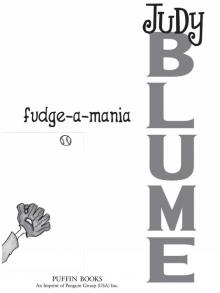 Fudge-a-Mania
Fudge-a-Mania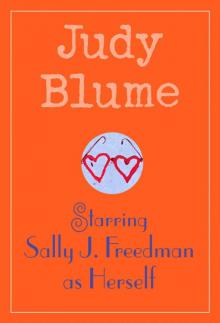 Starring Sally J. Freedman as Herself
Starring Sally J. Freedman as Herself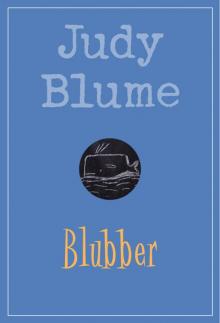 Blubber
Blubber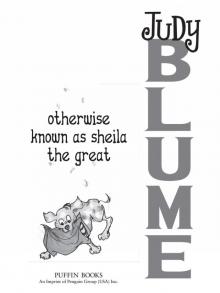 Otherwise Known as Sheila the Great
Otherwise Known as Sheila the Great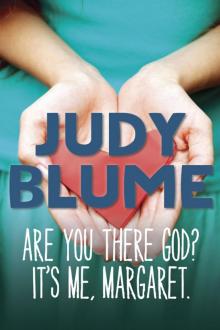 Are You There God? It's Me, Margaret
Are You There God? It's Me, Margaret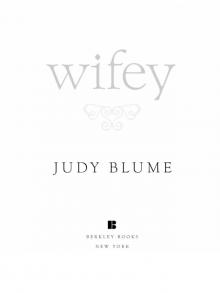 Wifey
Wifey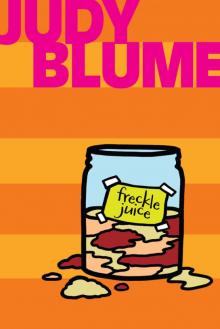 Freckle Juice
Freckle Juice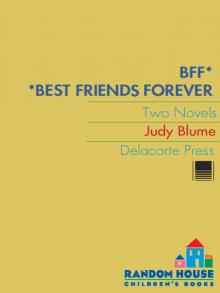 Just as Long as We're Together
Just as Long as We're Together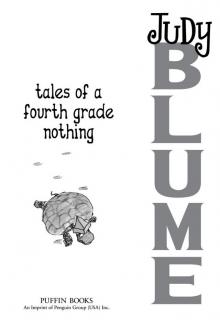 Tales of a Fourth Grade Nothing
Tales of a Fourth Grade Nothing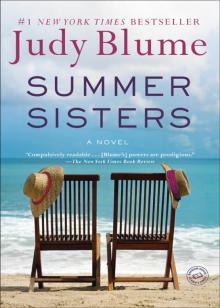 Summer Sisters
Summer Sisters Then Again, Maybe I Won't
Then Again, Maybe I Won't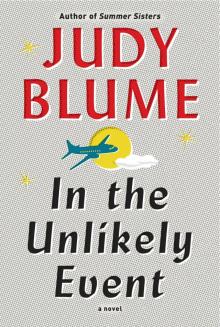 In the Unlikely Event
In the Unlikely Event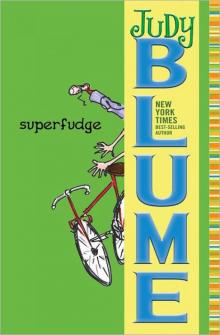 Superfudge
Superfudge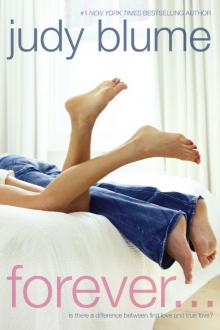 Forever . . .
Forever . . .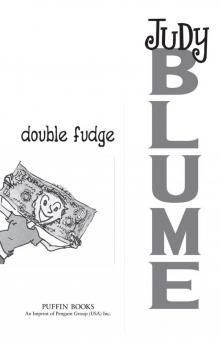 Double Fudge
Double Fudge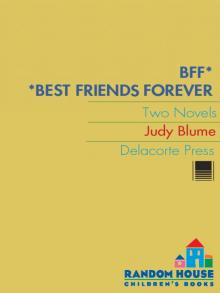 BFF*
BFF*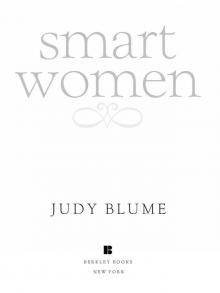 Smart Women
Smart Women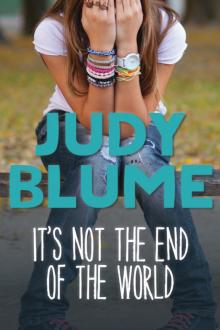 It's Not the End of the World
It's Not the End of the World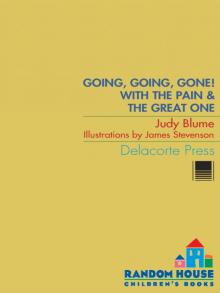 Going, Going, Gone! with the Pain and the Great One
Going, Going, Gone! with the Pain and the Great One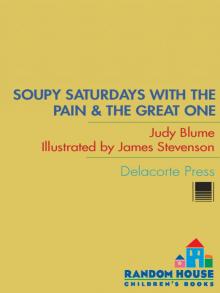 Soupy Saturdays with the Pain and the Great One
Soupy Saturdays with the Pain and the Great One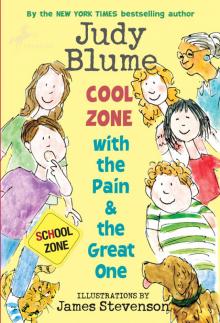 Cool Zone with the Pain and the Great One
Cool Zone with the Pain and the Great One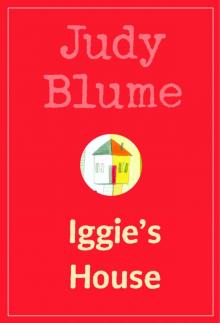 Iggie's House
Iggie's House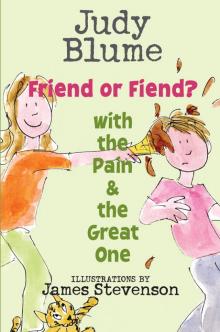 Friend or Fiend? with the Pain and the Great One
Friend or Fiend? with the Pain and the Great One